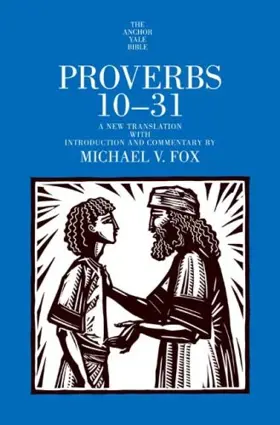

Proverbs 10–31
Pages
752 pages
Publisher
Yale University Press
Published
7/21/2009
ISBN-13
9780300142099
This volume completes Bible scholar Michael V. Fox’s comprehensive commentary on the book of Proverbs. As in his previous volume on the early chapters of Proverbs, the author here translates and explains in accessible language the meaning and literary qualities of the sayings and poems that comprise the final chapters. He gives special attention to comparable sayings in other wisdom books, particularly from Egypt, and makes extensive use of medieval Hebrew commentaries, which have received scant attention in previous Proverb commentaries. In separate sections set in smaller type, the author addresses technical issues of text and language for interested scholars.
The author’s essays at the end of the commentary view the book of Proverbs in its entirety and investigate its ideas of wisdom, ethics, revelation, and knowledge. Out of Proverbs’ great variety of sayings from different times, Fox shows, there emerges a unified vision of life, its obligations, and its potentials.
The author’s essays at the end of the commentary view the book of Proverbs in its entirety and investigate its ideas of wisdom, ethics, revelation, and knowledge. Out of Proverbs’ great variety of sayings from different times, Fox shows, there emerges a unified vision of life, its obligations, and its potentials.
Collections
This book appears in the following featured collections.
- Best Advanced OT Commentaries by Jason Gile
- Building an OT Commentary Library by Invitation to Biblical Interpretation (Kostenberger & Patterson)
Reviews
The eagerly anticipated second volume on the book of Proverbs, Proverbs 10–31, by Michael V. Fox, Halls-Bascom Professor in the Department of Hebrew and Semitic Studies at the University of Wisconsin, Madison, does not disappoint. Like the first volume, Proverbs 1–10 (hereafter cited as vol. 1), the second (vol. 2) models wisdom’s virtues: diligent, honest, competent, and judicious, to name those adjectives that come immediately to mind. The ethos that emanates from his commentary gives Fox authority and credibility and encourages others to emulate his wisdom (see 1:349). Like volume 1, volume 2 is erudite in depth, comprehensive in scope, copious but not tedious in length, and profoundly thoughtful in height. He converses easily with the ancient sages, traditional Jewish commentators, and his peers. Profitably, in volume 2 he also converses with evangelical scholars. By their faith in the God of Abraham, Isaac, and Jacob, they hear God’s voice in his “lisping” spokesmen as a sweet sound and hear the voice of higher biblical criticism, which replaces faith in God’s revelation with faith in the sufficiency of human reason, as the grating of an old scratched record. It matters not whether the tune of higher biblical criticism be Troeltschian, Duhemian, or Spinozistic.
[Full Review]
Fox follows up his highly regarded commentary on Proverbs 1-9 with another very good commentary. It will be hard to find a scholar more knowledgeable about ancient wisdom literature (including Babylonian, Egyptian and Greek). Not only are there numerous helpful insights on individual proverbs, but also interesting parallels with ancient near eastern wisdom literature, some history of interpretation and even 4 essays on subjects relating to wisdom, ethics and epistemology. For those preaching or teaching Proverbs, this will be a good commentary to consult, but should probably not be the only one. He makes no attempt at application or much theological reflection. If used alongside a couple other commentaries (Waltke, perhaps Garrett or others), the reader should come away with a strong grasp of the message of Proverbs.
[Full Review]


